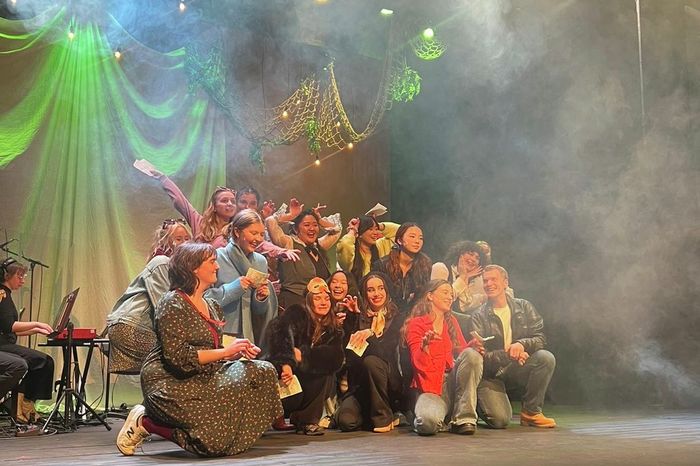The Duchess of Malfi will ‘haunt you still’
Webster’s classic is both bold and sensitive in its exploration of power and madness.

Taking the Corpus Christi Chapel as its stage, The Duchess of Malfi claims this unique space with ease. Directed by Maisie Johnson and assistant directed by Iona Boyer, every aspect of this production seems to have been sensitively considered, using movement, light and sound to construct a strong aesthetic coherence that delivered this fifteenth-century revenge tragedy with a fresh confidence. While this rendition animated Webster’s veiled commentary on the favouritism and vice of the court of James I, its emphasis fell on the even more subtle themes of the play; from the pain of sanity to the madness of power. At the centre of these tensions was the juxtaposition between the conflicted and yet stable Bosola, played by Joe Wright, and the trembling Ferdinand, played by Joshua Herberg. Employed by Ferdinand and the Cardinal to spy and bring pain upon their sister, the Duchess, Bosola is presented as a mind made heavy by the contradiction between who he believes himself to be, and the role he is made to play at court. Wright carries this internal discord with ease, handling the conscientious insights of the malcontent with a confidence that contrasts well with the instability that comes to consume Ferdinand. Herberg’s commitment to embodying the internal state of the character is striking. With a highly physical representation of Ferdinand’s insecurity that transforms naturally into an all-encompassing zoomorphism, Herberg engages us in examining the nature of Ferdinand’s motives, as they seep out from in his very movements with a pervasion deeper than madness.
"Taking the Corpus Christi Chapel as its stage, The Duchess of Malfi claims this unique space with ease"
The relationships of the Duchess, played by Emily Gibson, with her brothers, maid Cariola, played by Nadia Lines, and steward Antonio, are also well-handled. While initially we are unsure of the Duchess’ love for Antonio, played by Charles Wolrige Gordon, we are increasingly convinced by their relationship as one rooted in a kindness, like that with Cariola, that contrasts to the familial relations in the play. Gibson’s portrayal of strength in the face of the torture inflicted by her brothers is unabating, and yet while at times this means the complexity of the character and her unfathomable resilience is understated, the power of the Duchess is not lost. The Cardinal represents almost a mirror image of this intelligence and confidence, as Leo Kang Beevers deftly manages an almost unassuming cruelty in his treatment of others.
"The power of the Duchess is not lost"
Facing the audience on the other side of the candlelit aisle along which the action took place, watching this production also meant witnessing in a uniquely conscious way the genuine emotive response elicited by the actors’ performances. The audience was clearly captivated by the play’s most dramatic moments as well as its more subtle conversations and humorous endeavours. Managing these multifaceted requirements with ease, each member of the cast had crafted a distinct voice with a naturalness that gave a sense of balance to these moments of dramatic collaboration. The success of these moments is a testament to the director as well as the talented actors in the parts of the madmen, servants, soldiers, and court-attendants, played by Daisy Bates, Paddy Davies Jones, Ollie Norton, Natasha Atkinson, David Sleeman, Lucy Brougham and Iris Tadie.
"Watching this production also meant witnessing in a uniquely conscious way the genuine emotive response elicited by the actors’ performances"
Central to the cohesion that enabled these personalities shine through was the strong costume design by Viv Wang, which was faultless in its clean monotones and delicately bold addition of red in the necklace worn by the Duchess, perhaps as a juxtaposition to the weakness it represented in the attire worn by the Cardinal. Similarly, the choices in the use of the organ and the changing of light were simple but dramatic; as was the clever use of projection for a moment that truly shocked the audience.
Unafraid of the spaces it inhabits both physically and emotionally, this production exudes a self-awareness of the Duchess’ observation that ‘this world is a tedious theatre’, and explores what it means to play a powerful part within it.
The Duchess of Malfi is running until February 3 at Corpus Christi Chapel.
 Comment / Cambridge’s tourism risks commodifying students18 April 2025
Comment / Cambridge’s tourism risks commodifying students18 April 2025 News / Varsity ChatGPT survey17 April 2025
News / Varsity ChatGPT survey17 April 2025 News / Cambridge researchers build tool to predict cancer treatment success19 April 2025
News / Cambridge researchers build tool to predict cancer treatment success19 April 2025 News / Cambridge researchers find ‘strongest evidence yet’ of life on distant exoplanet18 April 2025
News / Cambridge researchers find ‘strongest evidence yet’ of life on distant exoplanet18 April 2025 News / Greenwich House occupiers miss deadline to respond to University legal action15 April 2025
News / Greenwich House occupiers miss deadline to respond to University legal action15 April 2025






